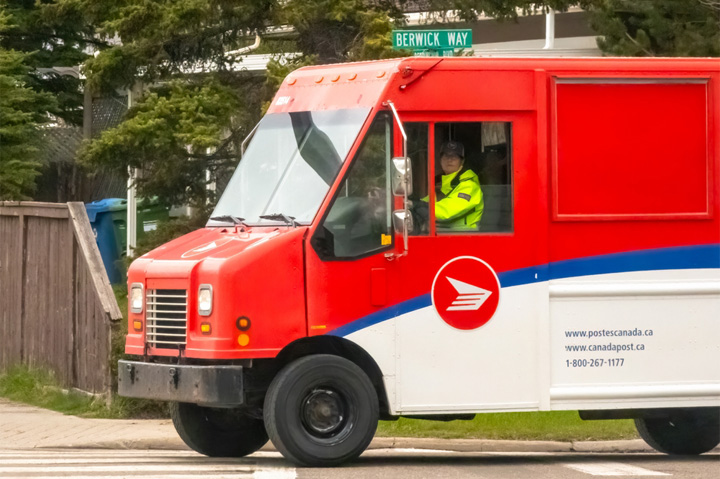News CANADIAN NEWS December 18, 2024
Canada Post Employees Head Back to Work
At the government’s request, the Canada Industrial Relations Board ordered more than 55,000 union members to return to their jobs after a strike that lasted nearly five weeks.
Key Takeaways
• Back-to-Work Order: At the behest of the federal government, the Canadian Union of Postal Workers (CUPW) was ordered back to work on Dec. 17 by the Canada Industrial Relations Board (CIRB) after a monthlong strike. The CIRB determined that the breakdown in negotiations in recent days warranted the move.
• Financial & Operational Impact: The strike significantly affected businesses, especially small- and medium-sized firms, during the critical holiday season. Canada Post is now working to clear a backlog of about 2 million parcels, with new mail not being accepted until Dec. 19.
• Union Concerns & Future Negotiations: CUPW members are concerned about the precedent set by the CIRB’s order and plan to challenge its constitutionality. The union’s contract has been extended to May 22, 2025, with a 5% wage increase retroactive to the expiration of the previous agreements.
Canada Post is back in business. At least for now.
More than 55,000 members of the Canadian Union of Postal Workers (CUPW) who staff Canada Post were ordered back to work on Dec. 17 by the Canada Industrial Relations Board (CIRB), which reviewed the dispute at the request of Labour Minister Steven MacKinnon and concluded that the two parties were at a significant enough impasse to warrant a back-to-work order.

The union had been on strike since Nov. 15 for a slew of reasons, including pay, benefits, working conditions and Canada Post’s use of contractors. The CUPW contract is now extended to May 22, 2025, when talks are set to resume. In the meantime, Canada Post has agreed to implement a 5% wage increase retroactive to the day after the collective agreements expired. CUPW had demanded a 24% increase over the next four years.
Some union members aren’t pleased and expressed concern about the precedent the CIRB order sets for Canadian workers.
“We’ve put up four weeks of our time on the line to fight for a fair negotiated contract for our members,” Charlene Bradley, president of the CUPW Local 612 in Ontario’s Sudbury District, told the CBC this week. “What happens in May? Are you going to do the same process again? Are you going to find a loophole, go to the CIRB and say, ‘Legislate us back to work in May?’ So, this is an attack to all unions.”
CUPW said it will be challenging the constitutionality of the order in a month. “This decision is disappointing to say the least for CUPW and all of our members who made sacrifices to fight for what is right and our rights to negotiate improvements to our working conditions,” the union said in a statement.
Meanwhile, businesses across Canada that depend on Canada Post, particularly small- and medium-sized firms, were hit hard during the critical holiday sales season. Canada Post has said that clearing through the backlog of about 2 million parcels will take time. The postal service won’t be accepting new mail until Dec. 19 and warns that anything now entering the system most likely won’t arrive at its destination by Dec. 25.
The strike also impacted Canadians, particularly in rural areas, who depend on the post for critical mail, such as important documents and medication.
In recent years, Canada Post has faced significant financial headwinds and was poised to end 2024 in the red for the seventh year in a row even before the strike.
In the promo industry, some companies rarely use Canada Post; others use it to varying degrees. “We work with multiple carriers, and in some cases, our customers use their own accounts with their preferred companies,” said Kim Ewchuk, director of sales and marketing for Botanical PaperWorks (asi/41273), a certified B Corp in Winnipeg. “Having Canada Post back as an option for our consumers is a positive development.”
It was a challenging time for Akran Marketing (asi/522788) in Ottawa, which has customers that still use Canada Post for fulfillment needs. “We specialize in online stores and tailored solutions for clients across various industries,” said Mikas Agarwal, chief digital officer. “Many of them rely heavily on Canada Post’s delivery integration. The strike effectively paralyzed our operations.”
The team at Akran had to quickly develop contingency plans and use companies such as Purolator and UPS, which were also operating at maximum capacity. That led to significant service delays, which in turn directly impacted the distributor’s receivables and cash flow. “Fortunately, we’re a debt-free and financially strong company, so we were able to weather the challenge,” said Agarwal.
But Agarwal can’t say the same about Canada Post; he laments its “poor management” in recent years that’s led to significant financial woes. “Delivery volume has fallen from 5 billion to 2 billion pieces annually, and it’s yet to adapt effectively,” said Agarwal. “Thankfully, the digital era has reduced our dependency on traditional mail for sending invoices, a practice we relied on heavily over a decade ago. Otherwise, the disruption would have been even more chaotic.”
